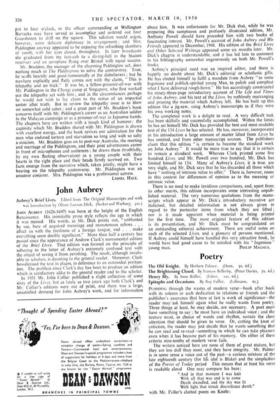John Aubrey
Aubrey's Brief Lives. Edited from The Original Manuscripts and with an Introduction by Oliver Lawson Dick. (Seeker and Warburg. 3os.) JOHN AUBREY (1626-1697) was born at the height of the English Renaissance. His inimitable prose style reflects the age in which it was minted. His words, as Mr. Dick points out, " unblunted by use, bare of acquired meanings and monotonous echoes . . . affect us with the freshness of a foreign tongue, and . . . make everything seem doubly significant." More than half a century has passed since the appearance of Andrew Clark's monumental edition of the Brief Lives. That edition was formed on the principle of adhering to the letter of Aubrey's extremely confused text with the object of saving it from perishing. The result, although invalu- able to scholars, is daunting to the general reader. Moreover. Clark bowdlerised the text in places, in deference to an outmoded puritan- ism. The problem since Clark's day has been to produce an edition which is satisfactory alike to the general reader and to the scholar. In 1931 Mr. John Collier published a slight collection of some sixty of the Lives, but as lately as two years ago both Clark's and Mr. Collier's editions were out of print, and there was a large, unsatisfied demand for John Aubrey's work, and for information about him. It was unfortunate for Mr. Dick that, while he was preparing this sumptuous and profusely illustrated edition, Mr. Anthony Powell should have preceded him with two books of fascinating interest. Mr. Powell's account of John Aubrey and His Friends appeared in December, 1948. His edition of the Brief Lives and Oilier Selected Writings appeared some six months later. Mr. Dick's chagrin is understandable, and it has led him to comment in his bibliography somewhat ungenerously on both Mr. Powell 's books.
Aubrey's principal need was an inspired editor, and there is happily no doubt about Mr. Dick's editorial or scholastic gifts. He has elected himself to fulfil a mandate from Aubrey "to some Ingeniose and publick-spirited young Man, to polish and compleat what I have delivered rough-hewn." He has accordingly constructed his ninety-three-page introductory account of The Life and Times of John Aubrey, and his text of the Lives, by ruthlessly rearranging and pruning the material which Aubrey left. He has built up this edition like a jig-saw, using Aubrey's manuscripts as if they were his own working notes.
The completed work is a delight to read. A very difficult task has been skilfully and successfully accomplished. Within the limits he has set himself Mr. Dick has provided the best and most readable text of the 134 Lives he has selected. He has, moreover, incorporated in his introduction a large amount of matter lifted from Lives he has omitted, and from other manuscript sources. The publishers claim that this edition "is certain to become the standard work on John Aubrey." It would be more true to say that it is certain to remain a standard work. Whereas Clark printed some five hundred Lives, and Mr. Powell over two hundred, Mr. Dick has limited himself to 134. Many of Aubrey's Lives, it is true, are very slight, and Mr. Dick says that he has discarded all those which have "nothing of intrinsic value to offer." There is, however, room in this context for differences of opinion as to the meaning of intrinsic value.
There is no need to make invidious comparisons, and, apart from its other merits, this edition incorporates some interesting unpub- lished material. The very numerous quotations from the manu- scripts which appear in Mr. Dick's introductory narrative are italicised, but detailed information is not always given in regard to the particular items from which they are lifted ; nor is it made apparent when material is being printed for the first time. The most original feature of this edition is its presentation, and Mr Dick must be congratulated on an outstanding editorial achievement. There are useful notes on each of the selected Lives, and a glossary of persons mentioned. If Aubrey could himself have handled this very attractive book, he would have had good cause to be satisfied with his " Ingeniose "


































 Previous page
Previous page